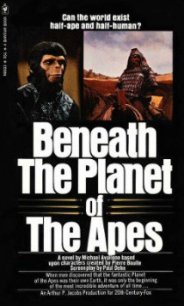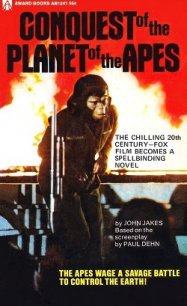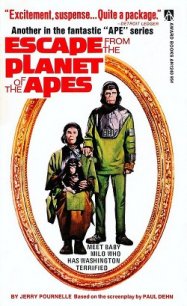Battle for the Planet of the Apes - Gerrold David (полная версия книги TXT) 📗
But they weren’t even good at that.
As Caesar, MacDonald, and Virgil crept over the ridge near the outpost, only one gorilla came alert. He sniffed at the air curiously and grunted. He poked one of his fellow guards. The other gorillas ignored him. They didn’t smell anything. Their senses had become blurred by disuse. Their vigil had been dulled by ennui.
Caesar, MacDonald, and Virgil passed undetected.
The sun rose to see them trudging across a region of sparse vegetation. The sky ahead went from black to deep blue, became bluer and bluer, then began getting pale, shading almost to white, then yellow and pink. Finally, a great ball of light showed its rim over the horizon and began climbing higher and higher to reveal itself as a blazing yellow orb. The sky around it was white with glare.
Their shadows stretched out behind them, then began shrinking as the sun climbed overhead. The morning began warming, and MacDonald shrugged out of his jacket. Later he loosened his shirt. The two apes too began to feel the heat but couldn’t do anything about it.
The ground was covered with dry scrub grass and occasional cactus. There were large boulders sticking up out of the sand. Once they saw a snake slithering out to sun itself on one of them. Another time they saw a rabbit, but by the time MacDonald got his Smith & Wesson out and loaded, it had disappeared.
They stopped to rest at a water hole and chew on some of the dried fruits and nuts they had brought with them; Caesar sniffed at the water and wrinkled his nose in distaste. They used the water in their canteens instead. They waited out the hottest part of the day and then moved on.
Evening saw them still struggling over the desert, the sun sinking behind them like a great red eye. The floor of the desert was sandy, and it was hard going, but they pushed on until it was too dark to see any more. Then and only then would Caesar let them stop for the night.
The stars were sharp, brilliant needlepoints of clarity, high and distant. The roof of the world was vast, filled with them. In the cold, dark night, surrounded by silence and stars, whipped by a cold breeze, MacDonald felt a chill in his bones. A chill and something more. He looked over at Caesar and Virgil. They were silent and stolid. He wondered if the two apes felt the same way when they looked at the incredible night sky. They were impassive.
What kind of emotions did apes have, anyway? They were more basic than humans—that was for sure. They were closer to nature. But, dammit, sometimes they seemed more rational than humans, more removed from life. And often they were impossible to decipher with their almost but not quite human expressions.
MacDonald fell asleep thinking about it. He dozed lightly. He kept waking up and falling asleep again. He tossed and turned and rolled around in his blanket, He slept fitfully on the hard cold ground, and his mind was troubled with images he couldn’t identify, things that weren’t distinct enough to be called dreams.
When he awoke, the two apes were already moving about, breaking up camp and preparing to hike on. MacDonald breakfasted lightly and unsatisfyingly on some dried fruits and joined them without comment. His head hurt from the uncomfortable, restless night.
Once more they trudged into the sunrise, Caesar in the lead, Virgil following eagerly, MacDonald beginning to show fatigue. The ground was rockier here, uneven and jagged. Several times he missed his footing and slipped. The apes were nimbler; they bounced from rock to rock.
It wasn’t until he noticed the first twisted girders that MacDonald realized that it wasn’t rocks he was stumbling over. It was shattered concrete.
He looked about him then, and with this new realization, saw that they had been walking through ruins for some time. As they moved up a low mound, he looked behind him and saw the shattered pattern of the city stretching out toward the distant horizon. He hadn’t even noticed. It faded out into the desert so gradually one had to know it was there in order to see it.
They reached the top of the hill, and Caesar stopped in sudden shock. Virgil came up beside him, also startled. A moment later MacDonald joined them. His mouth fell open in horror. The three of them stared ahead in awe and amazement.
“There it is,” said Caesar and then corrected himself. “Or was.”
Virgil was solemn. “It looks like a storm at sea.” he murmured. “But solidified.”
“It was done by a bomb from an armory one thousand times the size of yours,” said MacDonald.
“There must not have been anybody to keep its owner’s conscience,” remarked Virgil.
The three of them fell silent at that. They stood on the rise of ground and surveyed the nightmarish scene below.
As far as they could see, stretching to the distant horizon, the landscape was a jumbled ruin. It was the total desolation of one of man’s great cities, and it lay in a shambles of twisted and melted girders and concrete, shattered automobiles, fallen buildings, and ruined highways. The destruction was total. The city was massive, silent, and utterly dead. A monument to madness. A tribute to the game of war. The ultimate playground for generals. And gorillas.
The horrifying part of the scene was that it was also beautiful. There was a savage kind of color splashed across the land—reds and yellows and browns, streaked with blacks and whites in stark patterns. The texture of the desolation was brutally attractive, almost lovely in its roughness. It was too horrible to be real. And yet it was.
MacDonald’s voice was shaky. “London, Rome, Athens, Rio, Moscow, Tokyo, Peking . . .”
Virgil’s voice was firmer. “And Hell . . .”
But Caesar was firmest. “That’s where we’re going.” He moved resolutely forward. The other two exchanged a glance and followed him down the hill and into the worst of the ruins.
They clambered over surfaces that had been liquid for one brief but endless moment and then had become solid again. The city had not been blown apart—it had been melted, like a candle left out in the sun, but a sun a million times hotter and a million times closer.
Glass, masonry, steel—all had been dissolved by the incredible temperature at the center of the bomb. Everything seemed to have a smooth surface; everything seemed fused together. The buildings and structures had crumpled and flowed into one another; the city was a single piece of undifferentiated slag, a mountain of glass with cars, buses, and other objects too melted to identify, sticking out of it, a glacier of savagery and hatred.
MacDonald was thoroughly shaken by the horror around him. His eyes were moist, but his face was expressionless with horror. Even the two apes were ashen at the sight of so much destruction.
The man’s mind churned with thoughts; half-remembered phrases came unbidden to him, descriptions out of Dante, Kafka, and Sade. Hell was too pale a term to describe what they were passing through.
“My God,” he murmured. “My God. How could they have let this happen?” But there was no answer, not from the apes. Not from anyone else.
Caesar pointed toward a structure that seemed to be an underground entrance. “There,” he said. “Is that it?”
MacDonald peered, abruptly surprised out of his reverie. He nodded.
Virgil sniffed and took out the Geiger counter. He switched it on; it clattered, but not too loudly. He pursed his lips and frowned as he studied the meter on the device. “We are at best brave and at worst mad to be here. This background radiation alone will give us at least three hundred roentgens an hour.”
“Meaning?” Caesar looked at him.
“That if we’re not out of here within two hours, we shall become . . . inmates.”
“Hmf,” said Caesar. “Then we had better hurry.” He moved toward the entrance impatiently, MacDonald and Virgil hurrying to keep up.




